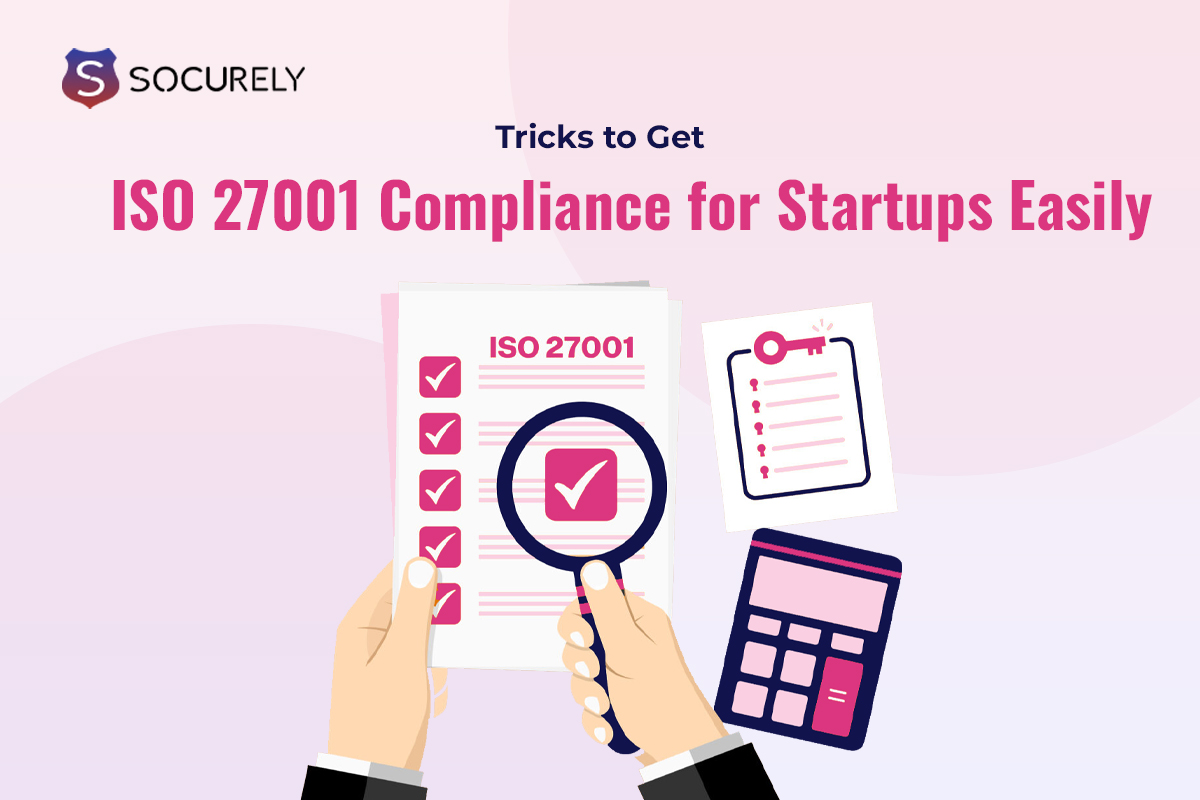For startups who want to secure their position in the competitive arena, data security isn’t a luxury; it’s a non-negotiable necessity. It’s something that enhances the credibility of the startups effectively. Among many tools, one that provides unhindered security to businesses is ISO 27001 compliance. Know how ISO 27001 compliance for startups benefits businesses from the following lines.
Here’s why becoming ISO 27001 certified as a startup is necessary
In the modern digital landscape, startups face several challenges, from resource constraints to the ever-looming pressure to innovate swiftly. Amidst this chaos, cybersecurity often takes a backseat, perceived as a cumbersome impediment to progress. However, ISO 27001 for startups can transform this narrative, aligning cybersecurity with business imperatives seamlessly. The benefits startups can get are:
Mitigated Cybersecurity Risks: ISO 27001 compliance for startups provides a structured approach to preemptively tackle cyber threats. By prioritizing risks and implementing tailored controls, startups can significantly diminish the likelihood and impact of data breaches and cyber incidents.
Meeting Elite Client Requirements: Establishing partnerships with top-tier clients often hinges on meeting stringent cybersecurity prerequisites. ISO 27001 for startups empowers startups to align with the robust policies and procedures expected by leading enterprises. By addressing cybersecurity concerns effectively, startups position themselves as reliable partners, transcending potential supply chain risks and regulatory hurdles.
Attraction of Investments: Investors seek assurance that their investments are shielded against cyber threats. ISO 27001 for startups serves as a testament to a startup’s proactive stance in mitigating cyber risks, augmenting its appeal to potential investors. By demonstrating a commitment to long-term cybersecurity resilience, startups enhance their valuation and attractiveness to investors.
Global Business Expansion: With the digital realm eliminating geographical barriers, startups can tap into global markets. However, expanded reach brings amplified cybersecurity scrutiny. ISO 27001 compliance bestows startups with a competitive edge in international markets, distinguishing them as secure and trustworthy entities amid escalating cyber threats.
Ensuring Regulatory Compliance: ISO 27001 for startups not only fortifies startups against cyber risks but also ensures adherence to industry-specific regulations such as HIPAA and Sarbanes-Oxley. For startups operating in regulated sectors, ISO 27001 certification streamlines compliance efforts, offering a comprehensive framework to navigate complex regulatory landscapes effectively.
Strategic Long-term Positioning: Becoming ISO 27001 certified as a startup is not a short-term imperative but a strategic decision with enduring benefits. As startups navigate the complex cybersecurity terrain, ISO 27001 certification lays the groundwork for sustained growth, safeguarding against the debilitating costs of cyber incidents while enhancing financial, regulatory, and reputational standing.
Any startup that deals with sensitive customer data, operates on a global scale or seeks to establish credibility in its industry can benefit from ISO 27001 compliance.
Whether you’re a tech startup handling user information or a service-oriented business managing confidential client data, ISO 27001 provides a framework for safeguarding assets and ensuring regulatory compliance.
What are the Challenges Startups Face to Get ISO 27001 for Startups?
Navigating the complexities of ISO 27001 compliance poses several challenges for startups, including:
- Understanding Framework Guidelines: The intricate nature of ISO 27001 compliance standards requires startups to decipher and implement relevant controls tailored to their unique risk profiles.
- Resource Constraints: Limited human resources, budgetary constraints, and time limitations often hinder startups from dedicating adequate efforts towards ISMS implementation.
- Stakeholder Resistance: Cultural shifts and procedural changes associated with ISO 27001 implementation may face resistance from stakeholders, necessitating strong leadership buy-in.
- Documentation Challenges: Startups must grapple with extensive documentation requirements, from risk assessments to policy statements, amidst limited experience with documentation processes.
- Process Gaps for Ongoing Monitoring: Establishing robust monitoring mechanisms for continuous ISMS evaluation poses a challenge for startups, particularly due to cost and time considerations.
Steps to Become ISO 27001 Certified as a Startup
Achieving ISO 27001 compliance as a startup requires a structured approach encompassing the following steps:
Build Your Team: To become ISO 27001 certified as a startup, assign roles and responsibilities, involving upper management, an information security steering committee, and a Chief Information Security Officer (CISO), to oversee the compliance process.
Understand Data Protection Requirements: Identify and categorize sensitive data assets, employing both top-down and bottom-up approaches to map information flow and assess asset value.
Evaluate Risks: Conduct comprehensive risk assessments to prioritize threats of ISO 27001 compliance for startups, assign security values to assets, and quantify the level of risk to inform control implementation.
Identify Controls for ISMS: Select and implement relevant security controls from the ISO 27001 Annex A, aligning them with organizational risks and objectives.
Conduct Frequent Internal Audits: Regularly assess ISMS performance, involve all stakeholders in audit processes, and address non-compliance issues promptly to ensure continual improvement.
Monitor ISMS Effectiveness: Employ performance indicators to monitor ISMS performance, detect breaches, and measure progress toward organizational goals.
External Audits: Undergo stage 1 and stage 2 external audits by ISO 27001 accredited auditors to validate ISMS compliance and address any non-conformities.
Continuous Improvement: Embrace a culture of continuous improvement, adapting ISMS practices to evolving threats and organizational changes beyond certification attainment.
Conclusion
ISO 27001 for startups isn’t just a one-time endeavor; it’s a journey toward enhancing information security resilience and organizational maturity. Despite the challenges startups may face, leveraging a structured approach and dedicating resources to ISMS implementation can yield significant long-term benefits, positioning startups for sustainable growth and competitive success in today’s dynamic business landscape.
Why Choose Socurely?
Socurely offers tailored solutions designed specifically for startups. By choosing Socurely, startups gain access to a dedicated team of professionals who guide them through every step of the certification process with precision and efficiency. From initial assessments to implementation and beyond, we ensure that startups achieve and maintain ISO 27001 compliance for startups seamlessly. With Socurely, by your side, startups can trust in a partner committed to their growth and success in the changing landscape of data security and compliance.
FAQs on ISO 27001 Compliance for Startups
Should I get ISO 27001 or SOC 2?
Both certifications offer unique benefits, with ISO 27001 providing a globally recognized standard for information security and SOC 2 is the North-America compliance standard. Startups should evaluate their business and customer needs before selecting the most suitable certification.
What Documentation is Required for ISO 27001 for Startups?
ISO 27001 compliance mandates various documents, including risk assessments, statements of applicability, inventory of assets, and records for training and internal audits. Startups must maintain comprehensive documentation to demonstrate compliance with ISO 27001 standards.
How Long is ISO 27001 Valid for Startups?
ISO 27001 certification is valid for three years, subject to surveillance audits to ensure ongoing compliance with standards requirements.
Is ISO 27001 Certification for Startups Worth It?
Absolutely. ISO 27001 certification not only enhances cybersecurity resilience but also fosters stakeholder trust, attracts investors, and unlocks startup business opportunities, making it a worthwhile investment in long-term success.







